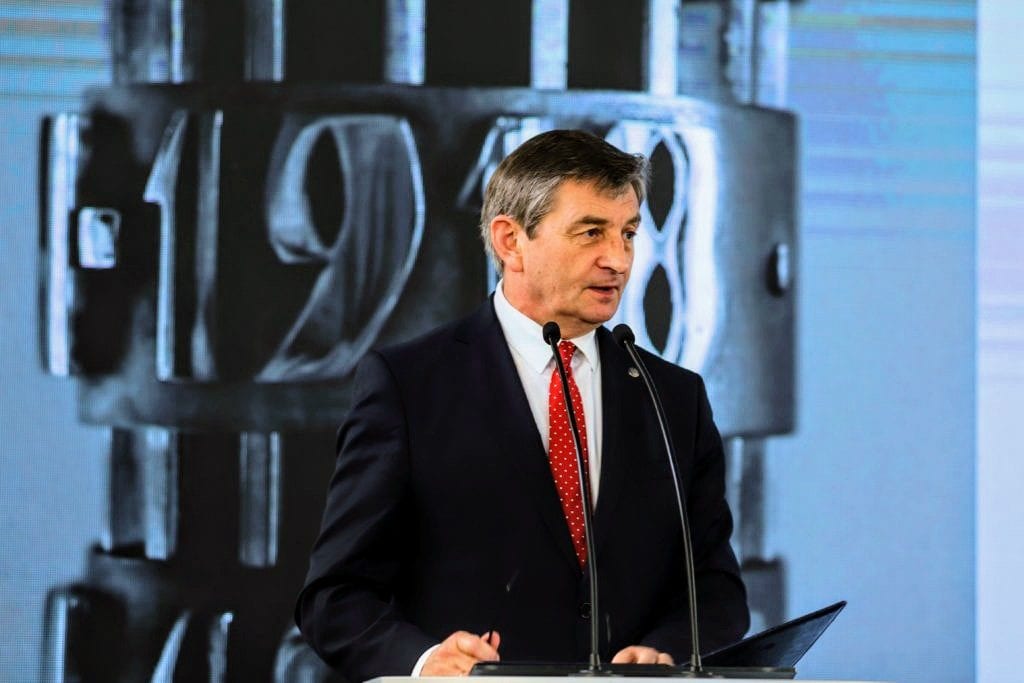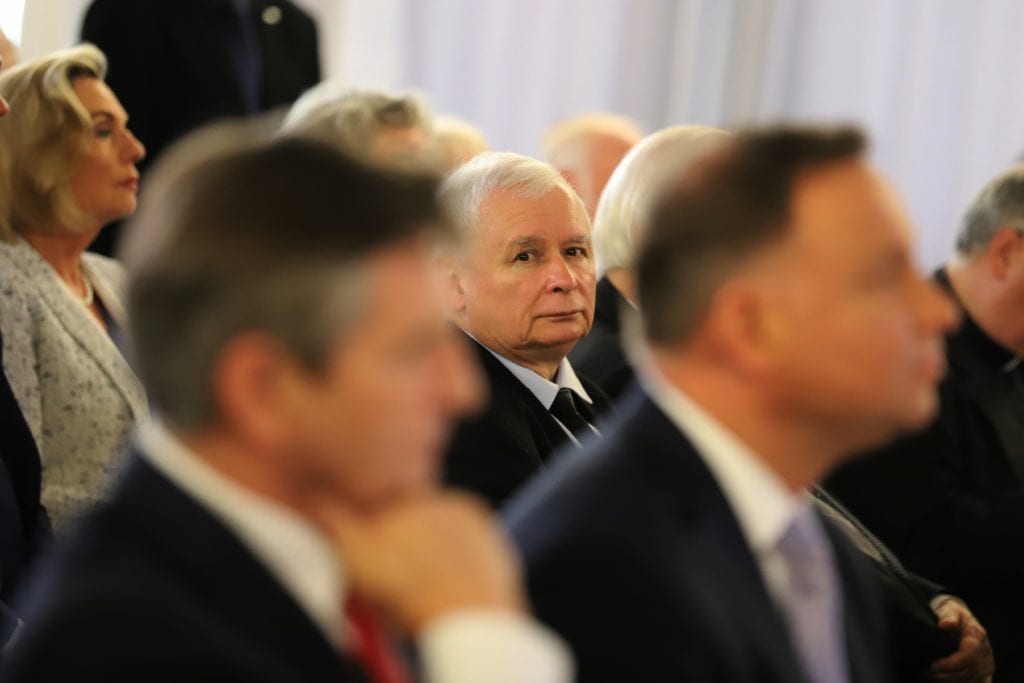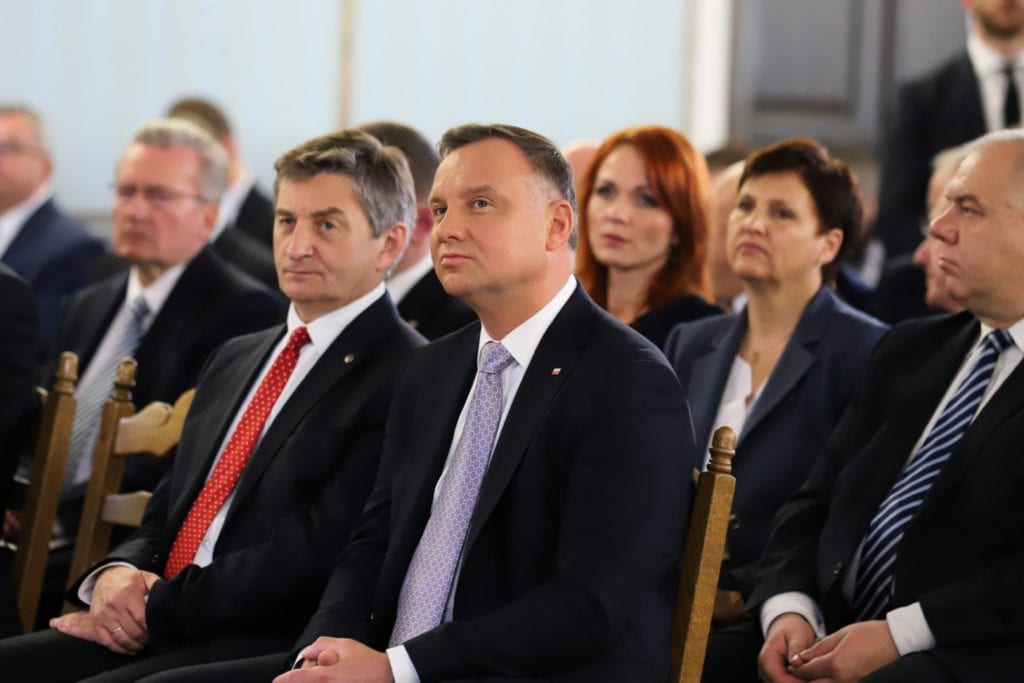President Andrzej Duda, Speaker of the Sejm Marek Kuchciński, Speaker of the Senate Stanisław Karczewski and Prime Minister Mateusz Morawiecki spoke at the ceremonies marking the 30th anniversary of the free elections to the Polish Senate.
Speech by Speaker of the Sejm Marek Kuchciński:
Thirty years ago, After long years of communist enslavement and lack of full sovereignty of the country, elections took place in our country, which became a breakthrough event in regaining freedom by Poland. We feel joy and pride from the victory achieved then. And although at that time the independence of the Republic of Poland was still very vague, it is today that we can clearly see the great significance of these elections.
It should be recalled that the course of these elections came as a complete surprise to the communist authorities, which were in full control of the mass media, had a huge material base at their disposal and were able to quickly mobilize hundreds of trained officers to conduct their own electoral campaign. These elections were only partly free, because the agreements of the so-called "Round Table" established for the opposition a 35 percent quota in the Sejm and free elections to the Senate. However, the opposition succeeded in getting all the deputies in the Sejm under the aforementioned agreement, and the Senate became completely free of representatives of the communist government.
Contrary to the expectations of those in power, the pro-independence circles gathered for the time of the elections in the Civic Committees "Solidarity", in a short period of time managed to create from scratch an organizational base, propose candidates for parliament and conduct a victorious election campaign. The society strongly supported the candidates put forward by the Civic Committees. This way, they supported reforms and the rejection of the totalitarian system.
It was the beginning of great change. What was impossible has become possible!
The events in Poland became an impulse for change in many neighboring countries and influenced the collapse of the Soviet Union. In a relatively short period of time, free countries neighbouring Poland were established: Lithuania, Latvia, Belarus, Ukraine. The Berlin Wall came down and Germany was unified.
It should be remembered that the June elections preceded the heroic uprisings for independence in our country. At the same time, the elections were a return to our great parliamentary traditions, going back to the 15th century, with the 3rd of May Constitution as a special achievement.
The road to the June elections in Poland since the end of World War II was long, took decades, was full of sacrifices and common struggles against totalitarian power, often, unfortunately, bloody. Poles have never reconciled themselves to the loss of independence, aware that the People's Republic of Poland was a state with limited sovereignty.
This situation led to a number of independence protests. In 1944-53, after Operation Tempest, an anti-communist uprising continued. In 1956, the events known by historians as the Poznan Uprising took place. It was not only the first large-scale general strike of workers, but also a local uprising in which dozens of people died and which accelerated the events of the Polish October. Hungary supported us in solidarity, also paying a blood sacrifice. Then, in March 1968, in Warsaw and other cities, anti-communist uprisings took place, first by students and intelligentsia, supported also by high school students, and then by other social groups. There were heroic acts, such as self-immolation of Ryszard Siwiec. Two years later workers went on strike and fought in Gdynia, Gdansk, Szczecin and Elblag. Further anti-communist uprisings broke out in 1976 in Radom and Ursus.
Against the backdrop of these protests and struggles, the election of Cardinal Karol Wojtyla to the See of Peter on October 16, 1978, became a great hope. From the beginning of his great pontificate, John Paul II influenced the peaceful changes in Poland; of particular importance was the Holy Father's First Pilgrimage to the Fatherland in June 1979 - during which the famous words were uttered at Victory Square, now Józef Piłsudski Square: "I cry out, I, a son of the Polish land, I cry out from the depths of the millennium: Let Your Spirit descend and renew the face of the earth. This earth!". During the entire pilgrimage, millions of Poles gathered in the cities and villages of our homeland to attend Holy Mass. In his homilies John Paul II called for respect for national dignity and tradition, spoke of freedom in social life and respect for the fundamental rights of every man.
A year later, in August 1980, the memorable strikes broke out on the coast, and soon throughout the country. They resulted in the creation of Solidarity, a trade union independent of the communist government. It soon became one of the main centers of opposition against communist power, grew into a powerful organization with ten million members, and began intensive activities for freedom and democratization of state life.
In response, on December 13, martial law was imposed throughout the country. This coup d'état, in fact, was directed primarily against opposition activists, including members of Solidarity. It was followed by several years of repression, referred to by historians as the Polish-Jaruzelski war. Thousands of people were arrested, including Solidarity leaders who were interned. Workers and students attempting to organize protests were subjected to harsh repression, and people died during the pacification of workplaces, for example in the Wujek mine. The publication of opposition magazines and the activities of all unions were suspended. Despite this, the resistance of society continued and grew.
The opposition's activities lasted until 1989, marked by many sacrifices, such as the martyr's death of the Solidarity chaplain Father Jerzy Popiełuszko, murdered by the Security Service on 19 October 1984 in Włocławek. As a result of continuous social resistance and the deteriorating economic situation in the country, the communist authorities decided to enter into talks with the opposition under the so-called "Round Table", which resulted, among other things, in the above-mentioned arrangements concerning parliamentary elections.
All these facts must now be recalled, in order to emphasize once again what a great breakthrough the time of the June in 1989.
Our meeting today is a celebration of Poland's freedom. It is a great celebration of democracy. Today Poland is safe, and like other countries of Central and Eastern Europe we can exist only under conditions of mutual trust, close cooperation and solidarity. Today, many countries in this part of Europe are united by the European Union and NATO.
The June elections, beginning a beautiful, wonderful, and above all bloodless Autumn of Nations in Europe, changed the face of Poland and the entire continent. It was the end of the Cold War, the final tearing down of the Iron Curtain and the destruction of the Yalta order. The Empire of Evil, the USSR, was disintegrating and this was an irreversible process.
I am glad that today we are celebrating together this great day of democracy on the 30th anniversary of extremely important events for Poland and Europe.
Photo by Marta Olejnik






